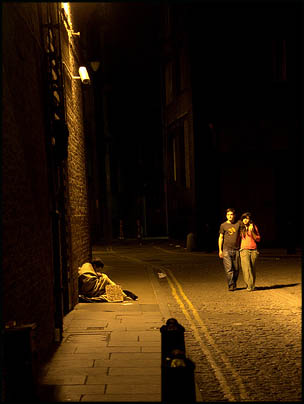
Today’s interesting person is Maria Foscarinis, Founder and Executive Director of the National Law Center on Homelessness & Poverty, who says,
[…] I’ve spent the past 20 plus years working for policies to prevent and end homelessness in America. In my experience, neither party has embraced our cause with vigor, but we’ve had strong individual allies and supporters in both major parties.
On the other hand, Foscarinis suggests that “bipartisan” is too often just another word for “compromise that leaves nobody happy.” She has little interest in whether something is or is not bipartisan, and great concern about whether it is or is not sane. Foscarinis says,
Rather than bipartisanship, what we should strive for is rational, sensible policy, supported by the best evidence available, consistent with our fundamental values… In an environment that favors sanity or even just reason and common sense, ending homelessness would be at the top of the agenda.
Being poor and homeless means more than just lacking a living wage and a roof, although those conditions are bad enough in themselves. It also means being without a voice. A person with the same address and phone number for 20 years can run into a hassle trying to register as a voter. Can you imagine how difficult it is for people experiencing homelessness?
Foscarinis brings up some unpleasant truths that few people think about. Some of us think about them. Even for a healthy person, it’s difficult to, for instance, get enough water to stay hydrated, a minimal and inescapable need. (And unfortunately, drinking any kind of liquid leads to another inescapable need, which is often difficult to meet without breaking the law.)
But what if you don’t have a place to live, and you’re on some kind of medication that needs to be refrigerated? What if you have to monitor your insulin levels, or replace your colostomy bag? What if you need daily, costly eye drops to keep from going blind? For people experiencing both homelessness and health problems, life must be hell.
Foscarinis cites a recent poll indicating that 53% of the American people are not sure if they will make their next mortgage payment or rent. It’s official: We are the Nervous Majority. She mentions such societal costs as the astonishing emergency room bills that one homeless person can rack up, and the amount of law enforcement resources wasted on hassling street people. She asks a question that gets down to the nitty-gritty:
Does anyone really believe it’s acceptable for people to be living without a home in the 21st century in the United States of America?
Foscarinis also speaks of the Universal Declaration of Human Rights, which is over 50 years old but doesn’t seem to have caught on as well as its drafters hoped. This document is also very important to Richard R. Troxell, who quoted extensively from it in his 1997 document known as the Protected Homeless Class Resolution. Here is an excerpt:
Whereas, the United States Government has adopted and is party to the United Nations Document referenced as the Universal Declaration of Human Rights, which ‘confers on every member of society a right to basic economic, social, and cultural entitlements, that every (nation) state should recognize, serve, and protect, of which food, clothing, medical care, and housing are definitive components of the right to a minimum standard of living and dignity’…
The Protected Homeless Class Resolution can be found in its entirety in Looking Up at the Bottom Line. Reactions?
Source: “Sanity, bipartisanship and homelessness: The impact of this week’s elections,” The Huffington Post, 11/05/10
Source: “Looking Up at the Bottom Line,” Amazon.com
Image by garryknight (Garry Knight), used under its Creative Commons license.
